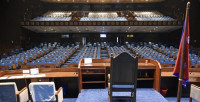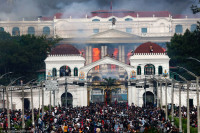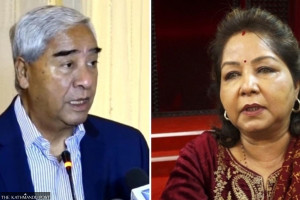Opinion
Spell it out
The constitution should say clearly that the state will be neutral towards all religions
Nepal’s political parties have been wrangling over whether to retain the term ‘secular’ or replace it with something ‘neutral’ in the coming constitution. A taskforce assigned to recommend ways to solve the problem has presented three options: Leave the term ‘secular’ as it is in the draft, replace it with ‘religious freedom’ or say nothing. However, all three proposals seem headed for a stalemate.
The Nepali translation of the term secular ‘dharma nirapekshya’ may be a little confusing, and some people may misuse it to politicise religion for their vested interests. Some Nepali Congress (NC) leaders and other dogmatic forces have already begun to argue that secular implies anti-Hindu. Therefore, secularism needs to be explained more clearly to avoid possible misinterpretation. Meanwhile, religious freedom only applies to the individual and not the state. Regarding the third option, keeping silent on a key issue such as this will be a historical blunder.
Religious freedom
Do secularism and religious freedom mean the same thing? Not by a long shot. Religious freedom is an individual’s right. And only a secular country allows a person to enjoy religious freedom in the real sense. How can an individual enjoy religious freedom when the country itself is tilted towards one particular religion? Moreover, how can a country be democratic if it favours one religion and discards others? Secularism refers to a concept that advocates forbidding religion from meddling with the government. In the context of Nepal, it may be difficult to make people understand the relevance of keeping religion and the state separate because there has been no power tussle between religious leaders and kings as in medieval Europe. However, this does not mean that there was no politicisation of religion in Nepal.
One example of politicisation of religion is the declaration of Nepal as a Hindu state by king Mahendra in the 1962 Constitution with the hope of gaining political benefits from the Nehru-led government of India and Indian Hindus. Now, unfortunately, some dogmatic forces seem to be attempting to reap political benefits from the religious sentiments of the general public to fulfil their vested interests. This is precisely the reason why Nepal must adopt secularism in the real sense, whether by inserting the very term or replacing it with other comprehensible phrases. However, secularism cannot be replaced with ‘religious freedom’ since it does not denote the same thing.
Jacques Berlinerblau, associate professor at Georgetown University, claims that secularism is necessary for religious freedom. He says secularism “enables citizens to live peaceably with other citizens whose creed is different than their own”. It is necessary to make the term secularism clearer instead of trying to
root it out. Similarly, religious freedom does not guarantee that the state will treat all religions equally. Therefore, neither concept can ensure both the rights—religious freedom to the individual and neutral position of the state with regard to all the religions.
Keeping silent
The third proposal suggests saying nothing about the issue. However, keeping silent cannot provide a solution to the problem in this case. Since the term secular has drawn flak from different quarters, and the state has failed to practice secularism even though the country was declared a secular state nine years ago, it is not wise to retain the same term that has lost its aura to denote that the state will be neutral towards all religions. It is necessary to clarify the impartial position of the state towards all religions by using other unambiguous words, phrases or sentences if the term secular remains a bone of contention instead of saying religious freedom or keeping silent.
Religious freedom is a must, but it cannot clarify the unbiased position of the state towards religions. The country must be clear regarding this important issue. It will be a blunder or keep silent on such a big problem. Nepal can follow in the footsteps of countries like Japan, Switzerland, Canada, China, Brazil and others in this regard which guarantee the neutral position of the state towards all religions and ensure religious freedom to each individual without using the very term ‘secular’.
Pandey is a TV journalist




 17.62°C Kathmandu
17.62°C Kathmandu









